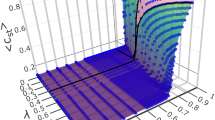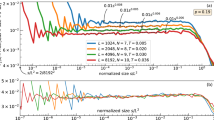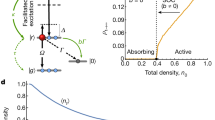Abstract
THE 'Game of Life'1,2 is a cellular automaton, that is, a lattice system in which the state of each lattice point is determined by local rules. It simulates, by means of a simple algorithm, the dynamical evolution of a society of living organisms. Despite its simplicity, the complex dynamics of the game are poorly understood. Previous interest in 'Life' has focused on the generation of complexity in local configurations; indeed, the system has been suggested to mimic aspects of the emergence of complexity in nature1,2. Here we adopt a different approach, by using concepts of statistical mechanics to study the system's long-time and large-scale behaviour. We show that local configurations in the "Game of Life" self-organize into a critical state. Such self-organized criticality provides a general mechanism for the emergence of scale-free structures3–5, with possible applications to earth-quakes6,7, cosmology8, turbulence9, biology and economics10. By contrast to these previous studies, where a local quantity was conserved, 'Life' has no local conservation laws and therefore represents a new type of universality class for self-organized criticality. This refutes speculations that self-organized criticality is a consequence of local conservation11, and supports its relevance to the natural phenomena above, as these do not involve any locally conserved quantities. The scaling is universal in the sense that the exponents that characterize correlation functions do not depend on details of the local rules.
This is a preview of subscription content, access via your institution
Access options
Subscribe to this journal
Receive 51 print issues and online access
$199.00 per year
only $3.90 per issue
Buy this article
- Purchase on Springer Link
- Instant access to full article PDF
Prices may be subject to local taxes which are calculated during checkout
Similar content being viewed by others
References
Berlekamp, E. R., Conway, J. H. & Guy, R. K. Winning Ways for Your Mathematical Plays Vol. 2 (Academic, 1982).
Gardner, M. Scient. Am. 223 (4), 120–124; (5), 118; (6), 114 (1970).
Bak, P., Tang, C. & Wiesenfeld, K. Phys. Rev. Lett. 59, 381–384 (1987).
Bak, P. & Tang, C. Phys. Today 42, S27 (1989).
Kadanoff, L. P., Nagel, S. R., Wu, L. & Zhou, S. Phys. Rev A39, 6524–6537 (1989).
Bak, P. & Tang, C. J. geophys. Res. 95, 15635–15637 (1989).
Carlson, J. M. & Langer, J. S. Phys. Rev. lett. 62, 2632–2635 (1989).
Chen, K. & Bak, P. Phys. Lett. A140, 299–302 (1989).
Bak, P., Chen, K. & Tang, C. Phys. Rev. Lett. (submitted).
Anderson, P. W. Bull. Sante Fe Inst. 4, 13 (1989).
Hwa, T. & Kardar, M. Phys. Rev. Lett. 62, 1813–1816 (1989).
Author information
Authors and Affiliations
Rights and permissions
About this article
Cite this article
Bak, P., Chen, K. & Creutz, M. Self-organized criticality in the 'Game of Life". Nature 342, 780–782 (1989). https://doi.org/10.1038/342780a0
Received:
Accepted:
Issue Date:
DOI: https://doi.org/10.1038/342780a0
This article is cited by
-
Conceptual modelling for life sciences based on systemist foundations
BMC Bioinformatics (2023)
-
Self-organized criticality dynamic of forest fire model
Indian Journal of Physics (2023)
-
Impact of landslide size and settings on landslide scaling relationship: a study from the Himalayan regions of India
Landslides (2022)
-
Machine behaviour
Nature (2019)
Comments
By submitting a comment you agree to abide by our Terms and Community Guidelines. If you find something abusive or that does not comply with our terms or guidelines please flag it as inappropriate.



